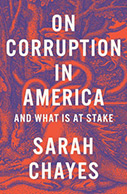On Corruption In America – And What Is At Stake

Author: Sarah Chayes
Publisher: New York: Alfred A. Knopf, 2020. 414p.
Reviewer: David O. Friedrichs | November 2020
Corruption kills. Corruption destroys. During the period of time that the reviewer was reading this book, an explosion in the port of Beirut killed almost 200 people, injured some 6,000 people, and caused massive devastation in the heart of the city, with billions of dollars of damage. In the United States during this period of time, well over 200,000 Americans had died due to Covid-19, with millions afflicted with the disease and with untold hundreds of billions of dollars of economic losses. In both cases corruption – broadly defined – was complicit in these tragic outcomes, in fundamental ways.
The author of this book, Sarah Chayes, has been wholly engaged with issues of corruption over the course of many years: as a journalist, as a foreign policy expert, and as an entrepreneur. The subtitle of an earlier book of hers, published some five years ago, conveys that book’s core thesis: Thieves of State: Why Corruption Threatens Global Security (Chayes, 2015). The political, social and economic consequences of corruption – globally and domestically – are simply monumental. On a global level, as Chayes persuasively documents in this earlier book, if pervasive, corrosive corruption in many countries around the world is not effectively addressed, it is far from evident that all the other problems afflicting these countries – including raging sectarian violence and gross economic inequality – can be overcome. In Thieves of State Chayes highlighted, in particular, the cases of Afghanistan, Arab countries such as Tunisia and Egypt, and other countries on the African continent such as Nigeria. In all of these countries Chayes was an active participant in interventionist initiatives, or was an observer as a journalist. The United States’ “longest war” in Afghanistan has had many tragic dimensions, not the least of which has been the privileging of purely military actions over confronting the entrenched governmental corruption.
As to the United States: this review is also being produced in the lead-up to the 2020 presidential election. The incumbent president at this time, Donald Trump, is quite certain to go down in history as the single most corrupt American president, in multiple different ways. He has presided over a cosmically corrupt administration. Ulysses S. Grant and Warren Harding are typically ranked among the worst American presidents. Although both of them presided over hugely corrupt administrations, neither of them was ever credibly accused of personal acts of corruption. The situation with Trump could hardly be more different. But altogether, his presidency has brought into especially sharp relief many dimensions of the American political system that are inherently corrupt and promote corrosive corruption across the political landscape. The increasing presence of “big money” in American politics has now been more fully recognized as distorting in fundamental ways policies adopted and implemented within our political system (e.g., see Lessig, 2011; Meyer 2017). In the case of Trump, we have the crushing irony of his having been elected in the first place at least in part on the claim that he would clean up “the swamp” of corruption in Washington, D.C.
Those approaching a book entitled “On Corruption in America” anticipating either a systematic, impersonal survey of corruption in America or a full-fledged review of the case of Trump and his corrupt administration will not here find either. A more systematic recent overview of corruption in America can be found in Zephyr Teachout’s (2014) Corruption in America, and we now have a long shelf’s worth of books addressing various dimensions of Trumpian corruption. Chayes’ style – on display also in Thieves of States – takes the form of mixing up expository sections with deep dives into ancient and not-so-ancient history along with accounts of her personal experiences and encounters. In a prologue, Chayes’ opens by noting the highly unfortunate Supreme Court decision in the case of McDonnell v. United States, which set forth an exceptionally narrow conception of political corruption that could be prosecuted as crime – i.e., old-fashioned quid pro quo bribery – and effectively protected transparently corrupt political practices as beyond the reach of such prosecution. Altogether, she notes corruption has been largely marginalized or ignored by Western decision-makers, including those in the USA, despite the obvious huge harm it both causes and promotes. It has been directly complicit in the degradation of the economy and the environment, and in our engagement in war. Prosecutions of conventional corruption cases have declined.
The present book is divided into five sections. The opening section addresses the origins of money, going back to the B.C. era, with attention to both mythical representations as well as the views of historical figures, including Aristotle and Jesus, whose confrontation with the money-changers in the Temple is clearly marginalized by contemporary evangelical Christians. Since the 1980s, a “greed is good” ethos became increasingly dominant within American culture, with an increasing percentage of “the best and the brightest” graduates of elite institutions of higher education heading to Wall Street rather than toward social service or teaching or scientific research careers.
The second section of the book, on “Crazy Money,” explores the “Gilded Age” and the “La Belle Epoque” of the late nineteenth century, as providing a foundation for later celebrations of great wealth and ostentatious displays of extreme affluence. Robber barons of this period were a source of far more harm than stagecoach robbers, but it is the latter who have more commonly been given attention as criminals. The adoption of the 14th amendment, purportedly to protect the most vulnerable citizens – newly freed slaves – was coopted to protect the least vulnerable entities: emerging mega-corporations.
The third section of the book, “The Hydra,” invokes the “many-necked monster” of mythology as an appropriate metaphor for corrupt kleptocratic structures. The late Justice Lewis Powell and the Federalist Society played key roles in laying a foundation for the vastly expanded clout of the contemporary American kleptocracy. The grotesque looting that has occurred in relation to defense contracts – as a consequence of a “military-industrial complex” – is just one illustrative case of kleptocratic corruption. Well-funded lobbyists have had great success in promoting the gutting of regulations introduced to protect the citizenry, and potential citizen outrage has been much deflected by the promotion of a false consciousness of materialism and by inter-group conflict. Chayes addresses the S & L looting and frauds, the Enron accounting misrepresentations case, and the subprime mortgage-driven financial crisis with unconditional bailouts as symptomatic of structural corruption within our political economy. Jane Mayer’s (2016) Dark Money – on the highly successful promotion of a political agenda favoring rich corporations, by the billionaire Koch brothers – is cited in this context. The truly abysmal U.S. Supreme Court Citizens United 2010 decision allowing unlimited corporate campaign contributions (as “free speech”) played a key role in all of this.
In the fourth section of this book, on “Fighting the Hydra,” some attention is devoted to initiatives to challenge corporate and Wall Street hegemony – e.g., by the labor movement, the Farmer’s Alliance and FDR’s New Deal – but it has been the entities associated with the rich and the powerful that have achieved the most success. In relation to 9/11 “… the greatest national security threat was not terrorism, it was right here on Wall Street” (p. 216). Although it is a sensitive topic, there is much reason to believe that systemic corruption on Wall Street and elsewhere has fueled ideologies supporting extreme violence.
In the fifth section of the book, “The Pattern,” Chayes addresses more fully the historical battles against the “Gilded Age” syndrome, and their relative failure. Since the Reagan presidency in particular, kleptocratic patterns have expanded in the United States. That Russia has taken the form of a full-blown kleptocracy since the fall of the Soviet Union is well-understood, but especially under Trump parallel patterns in the USA have become increasingly visible. The Clinton Administration played a role here in fostering deregulation of banking while promoting legislation leading to mass incarceration. Altogether, during a period when the costs of white-collar crime grew exponentially, prosecutions of white-collar crime cases declined. The professed American commitment to democratic values and a “rule of law” has been profoundly compromised.
In a final section, an “Epilogue,” Chayes concedes that there is no magic formula
available to overcome the grip of corruption on American society. “Herculean labors” are needed if we are to transform a kleptocratic political economy into one that is in the service of human life, not the relentless pursuit of private wealth. People only become billionaires by breaking rules. And the nurturing of real swamps – wetlands – taking precedence over the promotion of political “swamps” of corruption should be an aspiration. Initiatives such as getting big money out of politics and criminalizing inherently corrupt political practices are mentioned. Chayes asserts that all of us need to get involved in this existential battle against corruption, as if our lives depend upon that – because they do. Yes, this is an idealistic call for action against the Hydra-like monster that dominates our existence. But at the end of the day, perhaps it is all we have.
At various points in this book, Chayes directs attention to the case of Trump and various Republican cabinet officers and politicians, but she also attends to allegations of corruption that have been directed at luminaries of the Democratic party, including the Clintons, Madeline Albright, and Timothy Geithner. So in this sense the book cannot be characterized as a partisan rant against the corruption of only one political constituency.
It seems to me that as academic enterprises, neither criminal law nor criminal justice have devoted to the topic of corruption the attention it merits. More specifically, my own field of criminology has throughout its history, into the present, privileged attention to the crimes of the powerless – and control of such crime – over attention to the crimes of the powerful. The late William J. Chambliss’ (1988) On the Take: From Petty Crooks to Presidents was one noteworthy exception to criminology’s relative neglect of corruption and crimes of the powerful. The 2020 president of the American Society of Criminology, Sally Simpson – a prominent white-collar crime scholar – had planned on addressing corruption in her presidential address at the scheduled Washington, D.C. November meeting of the ASC, a meeting cancelled due to the pandemic. But it seems to me that a field of criminology that aspires to remain relevant in a rapidly changing 21st century world needs to devote proportionally far more attention to the crime of corruption – with its vastly harmful consequences – than has hitherto been the case. Sarah Chayes’ book should be one core resource for a criminology of corruption.
This reviewer has never met or had any direct contact with the author. But some forty years ago I introduced myself (at a professional conference) to her father, the late Abram Chayes, a distinguished professor of law at Harvard. He was very gracious, and then generous in his response to some work I sent him on a topic of mutual interest (the legitimation of the legal order). I don’t believe this positive experience has influenced my take on his daughter’s book, but in line with present norms of “full disclosure” I thought I would mention it anyway.
References
Citizens United v. Federal Election Commission, 558 U.S. 310 (2010)
McDonnell v. United States, 579 U.S. ____ (2010)
Chambliss, W. J. (1988) On the Take: From Petty Crooks to Presidents. Second edition. Indiana University Press.
Chayes, S. (2015) Thieves of State: Why Corruption Threatens Global Security. W. Norton & Co.
Lessig, L. (2011) Republic, Lost: How Money Corrupts Politics – and a Plan to Stop It. Twelve.
Mayer, J. (2017) Dark Money: The Hidden History of the Billionaires Behind the Rise of the Radical Right. Anchor Books.
Teachout, Z. (2014) Corruption in America: From Benjamin Franklin’s Snuff Box to Citizen’s United. Harvard University Press.
David O. Friedrichs is the author of Trusted Criminals: White Collar Crime in Contemporary Society 4e (2010).


